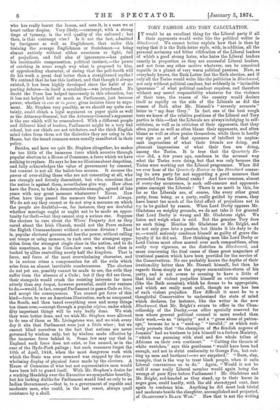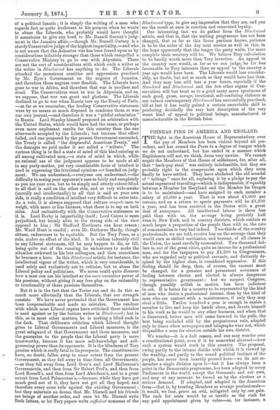TORY PASSION AND TORY CALCULATION.
1 I T would be an excellent thing for the Liberal party if all
their opponents would write like the political writer in Blackwood. We cannot better explain how that is than by saying that it is the Bath-letter style, with, in addition, all the personal acrimony and bitter vilification of the Liberal leaders of which a good strong hater, who hates the Liberal leaders exactly in proportion as they are successful Liberal leaders, and not from any other motive whatever, can be conceived capable in a planet of very warm political passions. Now, as everybody knows, the Bath Letter lost the Bath election, and if only all the Tories would write like the politician in Blackwood, not only without political candour, but evidently in "invincible ignorance " of what political candour requires, and therefore without any moral responsibility whatever for the violence of their tone, the reason of the country would declare itself as rapidly on the side of the Liberals as did the reason of Bath after Mr. Disraeli's "severely accurate" letter to "my dear Grey." In fact, one of the best rough tests we know of the relative positions of the Liberal and Tory parties is this,—that the Liberals are always indulging in self- criticism, as well as in criticism of their opponents, that they often praise as well as often blame their opponents, and often blame as well as often praise themselves, while there is hardly any sign as yet of that openness of intellect to unplea- sant impressions of what their friends are doing, and pleasant impressions of what their foes are doing, among the Tories. It is true that the Quarterly Re- view did, a few years ago, condemn in the severest way what the Tories were doing, but that was only because the Tories were working out the Liberal programme. When did we ever hear of the Quarterly Review or the Standard censur- ing its own party for not supporting a good measure that proceeded from the Liberal ranks ? And how common, almost of every-day occurrence, is such self-censure and opponent- praise amongst the Liberals! There is no merit in this, for far as the Liberals are, of course, like every other great party, from being, as a party, really guided by reason, they have learnt too much of the fatal effect of prejudices not to try to be guided by reason. When Lord Derby opposes Mr. Gladstone on weighty grounds, we do not take it for granted that Lord Derby is wrong and Mr. Gladstone right. We listen and weigh what is said. But the genuine Tory does no such thing. Mention Mr. Gladstone or Mr. Bright, and he not only goes into a passion, but thinks it his duty to do so,—would seriously condemn himself as guilty of grave dis- loyalty if he did not. How thinking men like Lord Derby or Lord Cairns must often marvel over such compositions, often really very vigorous, as the diatribes in Blackwood, and muse concerning the final cause of those great magazines of irrational passion which have been provided for the service of the Conservatives. No one probably knows the depths of their irrationality better than Mr. Disraeli himself, but then he regards them simply as the proper ammunition-stores of his party, and is not averse to seeming to have a little of that kind of violent prejudice himself on certain occasions (like the Bath occasion), which he deems to be appropriate, and which are really most unfit, though no one has less of such violent prejudice. How difficult it must be to a thoughtful Conservative to understand the state of mind' which declares, for instance, like the writer in the new Blackwood, that Mr. Bright's return to office in the Chan- cellorship of the Duchy,—an office specially reserved for men whose general political counsel is more needed than their work,—is an "iniquity" and a "gross abuse of patron- age," because he is a " used-up " "invalid ;" or which seri- ously protests that "the champion of the fiendish negroes of Jamaica" had no business to join himself to a forlorn Ministry, "which was pursuing with steel and fire whole tribes of Africans on their own continent." "Cutting the throats of white wretches," says this gentleman "would have been bad enough, and not in strict conformity to George Fox, but cut- ting up men and brothers1—we are surprised." "Burn, slay, trample, that is the way to treat black people, when it suits Liberal convenience so to do." Again, "Would it not be well if some really Liberal member would again bring the wrongs of poor Eyre before Parliament ? Mr. Gladstone and Mr. Bright, red-handed as they stand, up to their knees in negro gore, could hardly, with the old stereotyped cant, dare again to condemn him. Anything he did must look trivial and moderate beside the slaughter, accomplished and projected, of GLADSTONE'S BLAME Wes." Now that is _not the writing of a political lunatic ; it is simply the writing of a man who regards fact as quite irrelevant to his purpose when he wants to abuse the Liberals, who probably would have thought it monstrous to give any heed to Mr. Russell Gurney's judg- ment in the Jamaica affair,—though Mr. Russell Gurney is a sturdy Conservative judge of the highest impartiality,—and who is not aware that the Ashantee war has been forced upon us by considerations infinitely stronger than those which compelled a Conservative Ministry to go to war with Abyssinia. These are not the sort of considerations with which such a writer as the writer in Blackwood has anything to do. The Liberals attacked the monstrous cruelties and oppressions practised by Mr. Eyre's Government on the negroes of Jamaica, and therefore those negroes were fiendish. The Liberals have gone to war in Africa, and therefore that war is needless and cruel. The Conservatives went to war in Abyssinia, and so, we suppose, that war was great and glorious. The Liberals declined to go to war when Russia tore up the Treaty of Paris, —as far as we remember, the leading Conservative statesmen were by no means so much disposed to condemn them as was our own journal,—and therefore it was a -"pitiful submission" to Russia. Lord Stanley himself proposed an arbitration with the United States, which would have had the same, or perhaps even more unpleasant results for this country than the one afterwards accepted by the Liberals ; but because that effort failed, and one proposed by the present Government succeeded, the Treaty is called "the disgraceful American Treaty," and the damages we paid under it are called a "tribute." The curious thing is to find a state of mind of this kind existing at all among cultivated men,—a state of mind in which, while no rational use of the judgment appears to be made at all in any party-matter, yet very considerable force of intellect is used in expressing the irrational opinions not founded on judg- ment. We can understand,—everyone can understand,—the difficulty in seeing your opponent's case so fairly and completely as you see your own, but to be simply and utterly colour-blind to all that is said on the other side, and so very wide-awake (Morally and intellectually) to all that is said on your own side, is really a condition of intellect very difficult to enter into. As a rule, it is always supposed that culture compels men to weigh, with more or less fairness, what there is to say on both sides. And undoubtedly with the Conservative statesmen so it is. Lord Derby is impartiality itself ; Lord Cairns is more prejudiced, but keenly alive to the strong side of the view opposed to him ; Sir Stafford Northcote can hear reason ; Mr. Ward Hunt is candid ; even Mr. Gathorne Hardy, though obtuse, endeavours to be equitable. But the Tory Press, as a rule, makes no effort of the kind. It is seldom tolerably civil to any Liberal statesman, till he may happen to die, or till, being quite out of the running, he endeavours to make the situation awkward to his late colleagues, and then sometimes he becomes a hero. In this Blackwood article, for instance, the intellectual vigour of the writer, which is very considerable, is used solely and exclusively not to criticise, but to abuse the Liberal policy and politicians. We never could quite discover how a man can use his intellect as the mere executive power of his passions, without giving it any free play on the rationality or irrationality of those passions themselves..
But it is in the fact that the Tories can and do do this so much more effectually than the Liberals, that our strength consists. We have never pretended that the Government has been irreproachable and made no mistakes. The candour with which most Liberal organs have criticised these mistakes is used against us by the furious writer in Blackwood; bat in this, as in most other matters, he is making a blind rush in the dark. That deliberate criticism which Liberal thought gives to Liberal Governments and Liberal measures, is the great safeguard of that Government and those measures, and the guarantee to the people that the Liberal party is more trustworthy, because it has more self-knowledge and self- governing power than its opponents. It is the blindness of Tory passion which is really fatal to its prospects. The constituencies have, no doubt, fallen away to some extent from the present Government, as they fall away in time from all Governments, —as they fell away from Lord Grey's and Lord Melbourne's Governments, and then from Sir Robert Peel's, and then from Lord Russell's, and then from Lord Aberdeen's, and to a great extent from Lord Palmerston's,—because, while they have got much good out of it, they have not got all they hoped, and therefore every error tells against the existing Government ; but they entertain no dream that Mr. Disraeli and his friends are beings of another order, and once let Mr. Disraeli write Bath letters, or let Tory papers write sufficient nonsense of the Blackwood type, to give any impression that they are, and you see the result at once in reaction and renovated loyalty.
One interesting fact we do gather from the Blackwood article, and that is,. that the waiting programme has not been changed, that as far as this fierce partisan knows, patience is to be the order of the day next session as well as this, in the hope apparently that the longer the party waits, the more complete their recovery will be. We believe Tory calculation to be hardly worth more than Tory invective. An appeal to the country now would, as far as we can judge, be far less favourable to Tory interests than an appeal to the country a year ago would have been. The Liberals would lose consider- ably, no doubt, but not as much as they would have lost then. And they may lose still less a year hence, especially if the Standard and Blackwood and the few other organs of Con- servatism will but treat us to a good many more specimens of such good, gross, savage, irrational, self-confuting violence as our valued contemporary Blackwood has successfully practised, till at last it has really gained a certain unenviable skill in producing decidedly the very best description of the very worst kind of appeal to political beings, manufactured or manufacturable in the British Isles.











































 Previous page
Previous page